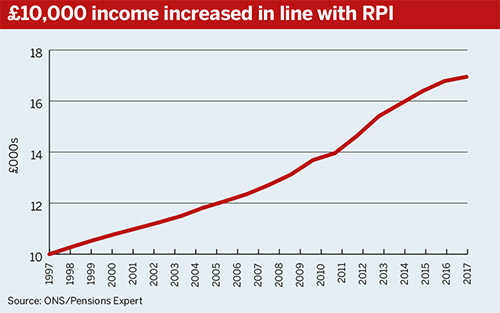The shadow pensions minister has called on ministers to leverage lucrative contracts it awards to Hewlett Packard Enterprise to persuade the company to protect pensioners who are seeing their benefits eroded by inflation.
Labour MP Jack Dromey’s demand came after a pensioner campaign group accused the government’s procurement service of breaking its code of conduct by awarding the company continued business.
Companies were not legally required to provide defined benefit members with inflation proofing, know as indexation, until 1997, although many companies volunteered to protect the value of their promises to employees.
With every passing year the struggle to maintain a decent standard of living becomes increasingly difficult
Steve Spillane, HPPA
However, a handful of companies, mostly US multinationals, have refused to grant these discretionary increases over several years.
Some pensioners formerly employed by Digital Equipment Corporation, which came under HPE’s control in 2002, have seen their benefits slashed in real terms.
Contracts provide leverage
Previous attempts to persuade companies to agree to increases have failed, and any change in the law would likely be ruled retrospective.
However, campaigners have pointed to the government’s purchase of HPE products as potential leverage, which Dromey agreed could be used to change behaviour.
“Both Hewlett Packard and the government should discharge their responsibilities to the workers who, over many decades, built the success of the company,” the member for Birmingham Erdington said.
HPE and its subsidiaries hold contracts worth around £1bn a year with branches of the UK government including the Ministry of Defence, the Department for Work and Pensions and the Ministry of Justice, according to the Hewlett Packard Pension Association.
Dromey continued: “Hewlett Packard should be ashamed of itself. Ministers should now use the leverage they have to make Hewlett Packard see sense.”
Value of benefits drops again
Most schemes sponsored by HPE have their benefits indexed in line with inflation. However, the nearly 4,000 members of the DEC scheme have only been awarded discretionary increases in two of the last 16 years.
The purchasing power of pre-1997 DEC pensions has declined by 50 per cent in the 16 years since HPE took over responsibility for the scheme.

Steve Spillane, an HPPA member from Berkshire, said: “With every passing year the struggle to maintain a decent standard of living becomes increasingly difficult. We trusted our employer to ‘do the right thing’, but that trust has been totally destroyed by HPE.”
Martin Ranwell, another member from Modbury, said the group’s representations to HPE have “fallen on deaf ears” and were no longer receiving responses.
While pensioner incomes have increased by 2 per cent since 2002, £10m in CEO bonuses have been paid, UK employee pay has risen 36 per cent, and dividends have increased 100 per cent, according to the HPPA.
This has led the HPPA to argue that the company is behaving in a discriminative, exploitative and unethical way in the context of the code of conduct governing the Crown Commercial Service, the government’s purchasing agency.
The association wrote to then CCS chief executive Malcolm Harrison in April to complain that the organisation was breaking its own rules, and then to Cabinet Office minister David Lidington, whose department oversees the CCS, in August.
A spokesperson for HPE said: “As with any concern raised by our pensioner population, HPE believes that we continue to give this matter due and appropriate consideration. These decisions are reached after careful consideration of a number of factors.”
The Cabinet Office did not respond to a request for comment by publication time.
Legal case remains shaky
The HPPA is unlikely to be successful in arguing that the CCS has breached its code of conduct, according to Mark Smith, a partner at law firm Taylor Wessing.
He said the plight of younger generations, who typically receive less generous defined contribution pensions, would make it hard to argue that the company was discriminating solely against select DB members.
“I can’t see how a refusal to increase someone’s benefits is unethical if someone is complying with their obligations.”
He added that a recent court decision surrounding the Box Clever scheme had opened up the possibility of laws acting retrospectively in some cases, but doubted whether the government would be able to add historic obligations to companies.

























